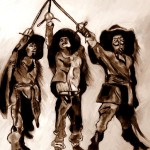Congregation Beth Mordecai
Congregation Beth Mordecai
An inclusive congregation affiliated with the Conservative Movement.
Your Jewish Home for the Soul!
An inclusive congregation affiliated with the Conservative Movement.
Your Jewish Home for the Soul!
July 17, 2015 By bethmordecai no comments.
 Parashat Matot Ma-asei -- Will You Go to War With Me?
The Iran Deal agreed to this past week calls into question the ways in which regional powers (Israel, Gulf States) relate to their allies abroad (America, France, Great Britain, etc.). Are their allies standing by them or leaving them to deal with potential consequences of the deal?
This week's triennial Torah portion (Numbers 32 and 33) appropriately deal with the issue of whether "allies" (i.e. tribes) will go to war with their brethren if their immediate needs aren't threatened. Likewise, how willing are we to stick our necks out for our friends if we are not affected to the same degree as they are? Will we be present with them or[...]
Parashat Matot Ma-asei -- Will You Go to War With Me?
The Iran Deal agreed to this past week calls into question the ways in which regional powers (Israel, Gulf States) relate to their allies abroad (America, France, Great Britain, etc.). Are their allies standing by them or leaving them to deal with potential consequences of the deal?
This week's triennial Torah portion (Numbers 32 and 33) appropriately deal with the issue of whether "allies" (i.e. tribes) will go to war with their brethren if their immediate needs aren't threatened. Likewise, how willing are we to stick our necks out for our friends if we are not affected to the same degree as they are? Will we be present with them or[...]
Category : Online Learning Online Parashah Class Tag : brothers crossing Jordan Gadites God ma'asei ma-asei matot online learning online parashah class or hachayim parsha Reubenites war מטות מעסי
July 10, 2015 By bethmordecai no comments.
 Parashat Pinhas 2015/5775 (Triennial II) -- Won't You Be My Messiah?
Rabbi Saks' weekly Online Parashah Class will share insight from the Jewish tradition on how YOU can identify the coming of the messiah. The messiah might be right next door...don't you want to find out!?!?
Picture from oren neu dag [Attribution]
Click here for a chronological listing of Rabbi Saks' Online Parashah Classes
Click here for a listing of Rabbi Saks' Online Parashah Classes by Torah Portion
Parashat Pinhas 2015/5775 (Triennial II) -- Won't You Be My Messiah?
Rabbi Saks' weekly Online Parashah Class will share insight from the Jewish tradition on how YOU can identify the coming of the messiah. The messiah might be right next door...don't you want to find out!?!?
Picture from oren neu dag [Attribution]
Click here for a chronological listing of Rabbi Saks' Online Parashah Classes
Click here for a listing of Rabbi Saks' Online Parashah Classes by Torah Portion
Category : Online Learning Online Parashah Class Tag : abraham joshua heschel Book of Legends God king messiah Midrash online learning online parashah class parashah parsha pinchas pinhas priest prophets values weekly torah portion פנחס
June 19, 2015 By bethmordecai no comments.
 Parashat Korah (קרח) -- Criticizing Torah, Loving Torah
When you love something, do you shy away from being critical about it? Or is it possible to criticize out of love? We will discuss these questions through the lens of this week's Torah portion -- Parashat Korah (particularly Numbers 16) -- and the rebellion(s) of Korah and Datan and Aviram.
Join us for this fascinating exploration of the Torah portion!
Parashat Korah (קרח) -- Criticizing Torah, Loving Torah
When you love something, do you shy away from being critical about it? Or is it possible to criticize out of love? We will discuss these questions through the lens of this week's Torah portion -- Parashat Korah (particularly Numbers 16) -- and the rebellion(s) of Korah and Datan and Aviram.
Join us for this fascinating exploration of the Torah portion!
Category : Online Learning Online Parashah Class Tag : abraham ibn ezra biblical criticism korach korah online learning online parashah class torah
June 12, 2015 By bethmordecai no comments.
 Parashat Sh'lah L'kha (שלח לך) -- Why Is Life So Hard?
Every person experiences challenges in their daily life. For some those challenges are major and for some they are minor. But no one has experienced life without some aspect of pain, suffering, or difficulty. Why is this? Why can't life be easier? Why does it seem that we have to go through pain to discover life's greatest moments? This week, we will try to answer these questions by unpacking one verse (Numbers 14:17) from this week's Torah portion of Sh'lah L'kha with the help of the hasidic Torah commentary Noam Elimelekh.
Join us for this fascinating conversation about the nature of life!
Classes from other years:
Triennial III (2013/5773) -- One Torah[...]
Parashat Sh'lah L'kha (שלח לך) -- Why Is Life So Hard?
Every person experiences challenges in their daily life. For some those challenges are major and for some they are minor. But no one has experienced life without some aspect of pain, suffering, or difficulty. Why is this? Why can't life be easier? Why does it seem that we have to go through pain to discover life's greatest moments? This week, we will try to answer these questions by unpacking one verse (Numbers 14:17) from this week's Torah portion of Sh'lah L'kha with the help of the hasidic Torah commentary Noam Elimelekh.
Join us for this fascinating conversation about the nature of life!
Classes from other years:
Triennial III (2013/5773) -- One Torah[...]
Category : Online Learning Online Parashah Class Tag : Adam evil free will good Noam Elimelekh sh'lah l'kha sh'lakh l'kha shelach lecha שלח לך
May 8, 2015 By bethmordecai no comments.
Parashat Emor 2015/5775 (Triennial II) -- Shabbat Appears Everywhere Shabbat (the day of rest) is mentioned countless times in the Torah, including in this week's Torah portion of Emor (Leviticus 23:3). Why does this command appear so many different times? Isn't once enough? Today we will explore a number of places in which the Torah commands the Israelites to observe Shabbat. We will try to glean meaning from each instance using the interpretive principle of "smikhut parshiyot" (סמיכות פרשיות), which teaches us that the meaning of a text can be gleaned by understanding the context in which it is written. Please join us for this interesting class on the meanings of Shabbat!
Category : Online Learning Online Parashah Class Shabbat Tag : emor Leviticus 23:3 online learning online parashah class parsha shabbat weekly torah portion אמור
May 1, 2015 By bethmordecai no comments.
 Parashat Aharei Mot-K'doshim 2015/5775 (Triennial II) -- "For the Life of the Flesh is in the Blood"
The Torah teaches us that one of the key purposes to sacrifice animals is to limit capital punishment. When the blood of an animal is spilled on an altar, it sufficiently replaces the need to spill the blood of a human being (Leviticus 17:11). Why is animal blood a sufficient replacement for human blood? How does this practice relate to the Christian teaching that the spilling of "the blood of Christ" forgives the sins of humankind? Why does blood represent the life force of a living creature's life force? How do the laws of kashrut honor the notion that "the life of the[...]
Parashat Aharei Mot-K'doshim 2015/5775 (Triennial II) -- "For the Life of the Flesh is in the Blood"
The Torah teaches us that one of the key purposes to sacrifice animals is to limit capital punishment. When the blood of an animal is spilled on an altar, it sufficiently replaces the need to spill the blood of a human being (Leviticus 17:11). Why is animal blood a sufficient replacement for human blood? How does this practice relate to the Christian teaching that the spilling of "the blood of Christ" forgives the sins of humankind? Why does blood represent the life force of a living creature's life force? How do the laws of kashrut honor the notion that "the life of the[...]
Category : Online Learning Online Parashah Class Tag : acharei mot aharei mot blood k'doshim kedoshim life online learning online parashah class
March 20, 2015 By bethmordecai no comments.
 Parashat Vayikra 2015/5775 (Triennial II) -- All for One and One for All
The first verse of this week's triennial Torah portion (Leviticus 3:1) speaks of the "zevah sh'lamim korbano," the offering of the sacrifice of well-being. This sacrifice is the third of six sacrifices described in the early chapters of Leviticus (burnt, grain, well-being, sin, guilt, and thanksgiving). The key Hebrew root embedded in the offering of the sacrifice of well-being is "sh-l-m" meaning peace or wholeness. The rabbis in the Sifra, a 3rd century CE midrash on Leviticus, teaches us that because it contains the root "sh-l-m," the well-being sacrifice contains within it all of the other sacrifices so that TOGETHER they bring peace/wholeness to the world AND that[...]
Parashat Vayikra 2015/5775 (Triennial II) -- All for One and One for All
The first verse of this week's triennial Torah portion (Leviticus 3:1) speaks of the "zevah sh'lamim korbano," the offering of the sacrifice of well-being. This sacrifice is the third of six sacrifices described in the early chapters of Leviticus (burnt, grain, well-being, sin, guilt, and thanksgiving). The key Hebrew root embedded in the offering of the sacrifice of well-being is "sh-l-m" meaning peace or wholeness. The rabbis in the Sifra, a 3rd century CE midrash on Leviticus, teaches us that because it contains the root "sh-l-m," the well-being sacrifice contains within it all of the other sacrifices so that TOGETHER they bring peace/wholeness to the world AND that[...]
Category : Online Learning Online Parashah Class Tag : action collective history leviticus musketeers online learning online parashah class peace sacrifice shalom vayikra weekly torah portion well-being wholeness ויקרא שלום
March 6, 2015 By bethmordecai no comments.
Parashat Ki Tissa 2015/5775 (Triennial II) -- Can the Chasm Between God and Humanity Be Bridged? In this week's Torah portion we read the famous story of the Golden Calf (Exodus 32) in which the Israelites rebel against God. But more than just a simple rebellion, perhaps this "sin" indicates that the chasm between the holy (God) and the mundane (humanity) is too great to bridge. This issue is also addressed in the verse that opens the Torah portion prior to the story of the Golden Calf in which Moses receives the Torah from God (Exodus 31:18). Does the Torah reflect God's direct word? Or,[...]
Category : Online Learning Online Parashah Class Tag : Allegory Authorship Bridge Cave Chasm Exodus 31:18 Exodus 32 Exodus Rabbah 41 God Golden Calf humanity ki tissa Midrash online learning online parashah class parsha Plato Tablets torah Write כי תשא
February 27, 2015 By bethmordecai no comments.
 Parashat T'rumah 2015/5775 (Triennial II) -- The Gendered Language of Torah
In the second third of this week's Torah portion (Exodus 26:1-30), the term "sister" (achot) is to refer to cloths of Tabernacle's coverings (Exodus 26:3). Interestingly, this same term is used in Ezekiel's vision of the cherubim to refer to their wings (Ezekiel 1:9) which brings to mind a passage in Exodus 25:20 (back in our Torah portion) which uses the term "brother" to refer to the faces of Cherubim.
What can we learn from this gendered language? Is it nothing more than an idiosyncrasy of the Hebrew language? Or does it teach us something deeper about the Torah's (and rabbis') view of[...]
Parashat T'rumah 2015/5775 (Triennial II) -- The Gendered Language of Torah
In the second third of this week's Torah portion (Exodus 26:1-30), the term "sister" (achot) is to refer to cloths of Tabernacle's coverings (Exodus 26:3). Interestingly, this same term is used in Ezekiel's vision of the cherubim to refer to their wings (Ezekiel 1:9) which brings to mind a passage in Exodus 25:20 (back in our Torah portion) which uses the term "brother" to refer to the faces of Cherubim.
What can we learn from this gendered language? Is it nothing more than an idiosyncrasy of the Hebrew language? Or does it teach us something deeper about the Torah's (and rabbis') view of[...]
Category : Online Learning Online Parashah Class Tag : angels cherubim coverings Exodus 26 Exodus 26:3 gender language online learning online parashah class parsha t'rumah tabernacle terumah weekly torah portion תרומה
February 20, 2015 By bethmordecai no comments.
 Parashat T'tzaveh 2015/5775 (Triennial II) -- Wearing Sacred Clothes
Judaism has many sacred clothes or garments including tallit (prayer), tefillin (boxes and straps for arm and head), and kippah (head covering). Likewise, in this week's second triennial reading of the Torah portion (Exodus 28:1-29:18), Aaron and his sons wear sacred clothes for their roles as priests. What is the purpose of these garments? What purpose do they serve when we wear them? And what's more, what happens when we take them off? Does its "power" wear off? How different are we supposed to feel when wearing these garments versus when we're not wearing them?
Join us for this fascinating class on the power of[...]
Parashat T'tzaveh 2015/5775 (Triennial II) -- Wearing Sacred Clothes
Judaism has many sacred clothes or garments including tallit (prayer), tefillin (boxes and straps for arm and head), and kippah (head covering). Likewise, in this week's second triennial reading of the Torah portion (Exodus 28:1-29:18), Aaron and his sons wear sacred clothes for their roles as priests. What is the purpose of these garments? What purpose do they serve when we wear them? And what's more, what happens when we take them off? Does its "power" wear off? How different are we supposed to feel when wearing these garments versus when we're not wearing them?
Join us for this fascinating class on the power of[...]
Category : Online Learning Online Parashah Class Tag : Clothes covering Exodus 28:31-29:18 garments online learning online parashah class power purpose ritual Sacred t'tzaveh tefillin tetzaveh triennial weekly torah portion